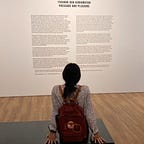A few days ago, my guy pal called me and told me about a dynamic in his relationship with his girlfriend. His girlfriend told him that she need some personal space to figure out her things. Turns out, it took longer time than he predicted. My friend was confused, because, in his opinion, his girlfriend is the type of clingy girl, that he thought won’t take a bigger personal space; she will drop all her things on the table for others. He referred to her habits to be cheerful and also greet the friends of my guy pal when they were on call.
It was kinda hard for me to explain things to my friends, and then I told him: everyone has several roles, selves, and responsibilities. We act differently in our every role and responsibility. For instance, I have several roles: as a daughter to my parents, as the oldest child in my family, as a worker in my workplace, as a friend to my peers, and as myself.
When I act as the only daughter in my family, I act so clingy and spoiled a lot. When I act as the oldest child in my family, I care about my sibling a lot, support him, and share various experiences for him to learn, to be his model to be independent. And so do others.
In a normal situation, our behavior might be not too different and in contrast. But when one of those roles is over-demanding, it’s quite hard for us to keep our role balance. Referring to William James and George Herbert Mead, people organizing their roles and identities is an empirical issue, and not an established fact. It is a live option for people to create a non-hierarchical pattern of self-organization.
Referring to the story of my guy pal, his girlfriend might be clingy when it comes to her relationship with my guy pal. Nevertheless, she will act differently when it comes to her stuff, her role as a worker in her workplace, her role as a daughter in her home, and even herself as a human and woman. Especially when one of her roles is demanding more than normal.
Thus, it’s kinda not right for us to judge someone dealing with their stuff, just based on the way they act towards us [despite our intuition that someone is doing bad to us].
Cheers!
